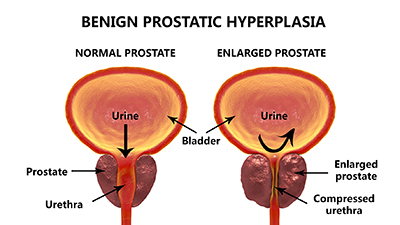Relationship Advice for Your Prostate?
Quality of life has a different meaning for many of us. I like to think it’s based upon a foundation of great relationships with family and friends. But when it comes to your prostate, things can get complicated.
The prostate is a walnut-sized gland which surrounds the urethra and is essential for male reproduction. It produces fluid which serves a protective role for sperm during reproduction as it’s propelled by the smooth muscle surrounding the prostate. Here’s where things get complicated. As men age, an enzyme produced throughout the body affects the size of the prostate. This enzyme, called 5-alpha reductase, converts testosterone to another sex hormone called dihydrotestosterone (DHT). Collectively, these hormones contribute to male sex characteristics which include deepness of voice, body-hair growth, reproductive organ development, and fat distribution. Unfortunately, dihydrotestosterone also accelerates cell growth within the prostate gland.
 Excessive levels of DHT can lead to benign prostate hyperplasia (BPH), a noncancer-related abnormal cell growth of the prostate gland. Gradual growth of the prostate for a man can advance from the size of a walnut in his 20s to an apricot in his 40s and as large as a lemon in his 60s onward.
Excessive levels of DHT can lead to benign prostate hyperplasia (BPH), a noncancer-related abnormal cell growth of the prostate gland. Gradual growth of the prostate for a man can advance from the size of a walnut in his 20s to an apricot in his 40s and as large as a lemon in his 60s onward.
How BPH affects a man’s plumbing is simple. As the prostate gland grows, it applies pressure on both the urethra and bladder. This leads to common symptoms of BPH such as trouble initiating urination, weak stream, sudden urge to urinate, stopping and starting several times while passing urine—and most importantly—frequent urination, especially sleep disrupting nocturia (nighttime urination). Men tend to accept these symptoms as a normal part of aging. Sleepwalking to the bathroom may even become “the norm” for some. However, disruptive nighttime urination (nocturia) can also lead to sleep deprivation for a significant other. When you consider the time it takes to fall back asleep following an interruption, this may rival snoring for sleep disruption.
 Prescription drugs which relax the muscle surrounding the prostate and enzyme inhibitors are popular approaches for BPH among the medical community. There are also surgical procedures for extreme cases. However, “watchful waiting” is the most common approach for BPH. This involves close surveillance with yearly exams and lifestyle adjustments, yet with no active intervention.
Prescription drugs which relax the muscle surrounding the prostate and enzyme inhibitors are popular approaches for BPH among the medical community. There are also surgical procedures for extreme cases. However, “watchful waiting” is the most common approach for BPH. This involves close surveillance with yearly exams and lifestyle adjustments, yet with no active intervention.
But there exist natural products that provide symptomatic relief from nagging symptoms of BPH. There is a wealth of studies featuring well-researched nutraceuticals available to consumers, as alternatives while you’re “watchfully waiting.”
 Let’s discuss several of the natural products that can make a difference. Berries from a dwarf palm tree native to the American Southeast called saw palmetto have been the topic of more than 35 human trials for BPH. Fatty acids within extracts of saw palmetto have been demonstrated to show improvement in urinary-tract symptoms in several ways. Their action via hormonal and anti-inflammatory pathways rivaled those of prescription drugs for the treatment of BPH. Rye flower pollen is another ingredient to look for in a formula for BPH management. Research involving 144 men with BPH receiving natural products including rye flower pollen showed decreases in both nocturia and daytime urinary frequency.
Let’s discuss several of the natural products that can make a difference. Berries from a dwarf palm tree native to the American Southeast called saw palmetto have been the topic of more than 35 human trials for BPH. Fatty acids within extracts of saw palmetto have been demonstrated to show improvement in urinary-tract symptoms in several ways. Their action via hormonal and anti-inflammatory pathways rivaled those of prescription drugs for the treatment of BPH. Rye flower pollen is another ingredient to look for in a formula for BPH management. Research involving 144 men with BPH receiving natural products including rye flower pollen showed decreases in both nocturia and daytime urinary frequency.
Free plant sterols, which are well known for their ability to block intestinal absorption of harmful cholesterol, possess an additional therapeutic property. They bind with the prostate gland to help reduce inflammation. A randomized, double-blind, placebo-controlled trial (RDBPCT) featuring 200 men taking plant sterols demonstrated increased peak flow and a decrease in residual volume within the bladder. Patients who continued sterol supplementation maintained improvement in symptomatic relief for an 18-month period. Great news for long term management of BPH!
There are also many vitamins, mineral, and micronutrients which contribute to a healthy prostate and urogenital tract. Trace minerals beneficial for prostate health include selenium, of which Brazil nuts are an excellent source; as well as zinc, which is abundant in pumpkin and sunflower seeds along with almonds, pecans, and walnuts. Vitamins B6 and D3 round out this important list.
Benign prostate hyperplasia is a common condition that men experience with aging. According to the Canadian Urological Association, more than half of men in their 60s and up to 90% of men in their 70s and 80s experience symptoms associated with BPH. This represents more than 3.7 million Canadian men. Sadly, the number of specialists in urology is not keeping pace with the current demand given our aging population.
There is good news though. There are well-researched, Health Canada–approved nutraceutical formulas that combine a variety of proven ingredients to deliver fast, effective relief from symptoms of BPH.
Size matters when it comes to prostate health. And in this case, bigger is not better!

 Stores
Stores